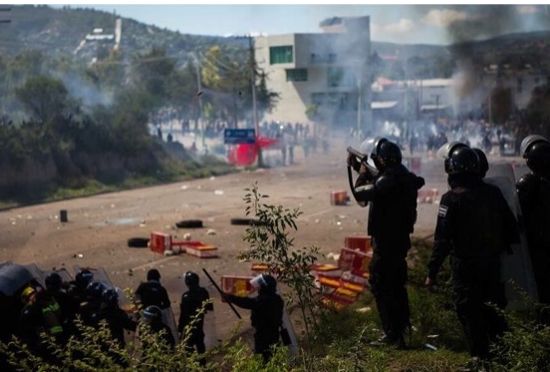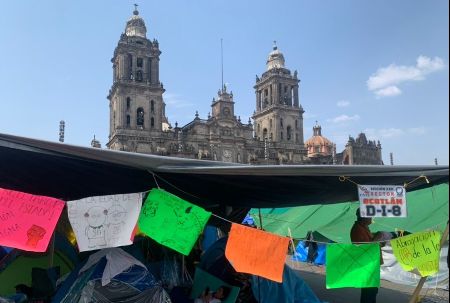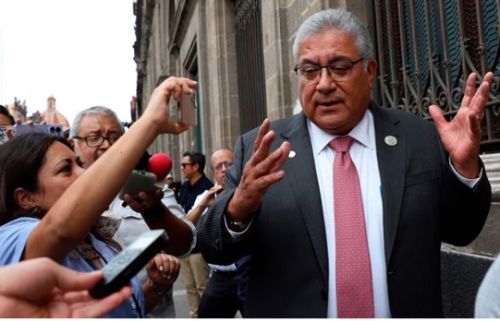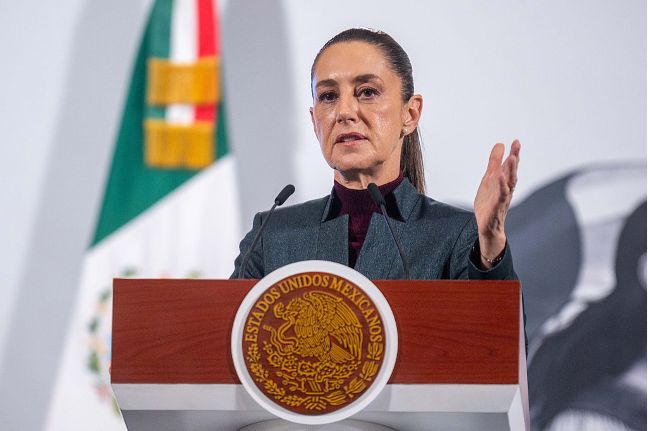|
|
The weekly newsletter of the Mexico Solidarity Project |
|
Every issue archived online at mexicosolidarityproject.org/archives/ |
|
July 23, 2025 |
|
|
|
Morena Disappoints: Teachers Get No Security |
|
Meizhu Lui, for the editorial team |
|
|
“There are no lifeboats. Every man and woman for themselves!” Not words you want to hear as the ship is sinking.
And not what you want to hear as you get older, when ordinary tasks become more difficult, and you don’t have the luxury of taking risks. But that’s the message we’ve been sent by neoliberal politicians. In the US and in Mexico, the neoliberals have tried with varying success to discontinue socialized old age pensions and Medicare health insurance and replace them with individual retirement and health savings accounts.
To add insult to injury, we are told this is for our own good — it’s freedom! That is, if you think freedom means being subject to the whims of the stock market, freedom to be exploited by private banks and financial advisors. They use your money to invest, and whether you gain or lose, they get their hefty fees. You take the risk; they never fail to profit.
In Mexico, President Lopez Obrador and the Morena party named neoliberalism as corruption, where the wealthy got richer at the expense of the poor, and they promised to reverse that equation. The Mexican people rejoiced when energy was re-nationalized and they could count on stable gas prices at the pump.
But the transformation is not completed. Neither AMLO nor President Sheinbaum has reversed the privatization of the retirement system. While the poorest have benefited from expanding social welfare programs, teachers remain on a treadmill, going nowhere. The failure is not only economic — one-size-fits-all education policies have eroded teacher job security and the freedom to adapt teaching to the needs of diverse student populations.
The radical teachers union, the CNTE, thinks they’ve waited long enough. They should not be told to sink or swim. Send the lifeboats! |
|
|
Mexico's Government Rejects CNTE Demands |
|
|
A longtime primary school teacher, Eligio Valdes now serves as the principal of the Ruben Jaramillo school. For 10 years, he led the CNTE section in Morelia, Michoacan, and he now serves as the General Coordinator of CNTE for the entire state of Michoacan, a CNTE stronghold. Eligio was a leader of the recent strike, which unfortunately ended without resolution of the union’s important issues. They are already in the process of rebuilding. |
|
The CNTE has been a driving force behind improvements in teachers' lives. What have you achieved over the years?
In my opinion, our most important achievement is becoming a large and democratic union of education workers that has remained active for decades. |
|
Despite internal difficulties, murders, disappearances, imprisonments and physical and administrative repression, we remain both a fundamental reference point for developing alternative teaching methods and an example of popular and class struggle. |
|
|
Mexican police clash with teachers protesting neoliberal education reforms in Oaxaca, Mexico, 6/17/16: STR/AFP/Getty Images: Andalusia Knoll Soloff for In These Times |
|
For example, we obtained salary increases and bonuses for teachers. Second, we not only raised money for students to cover school supplies and other expenses but also provided them with bicycles. For their families, we provided agricultural tools and fertilizer.
Third, we secured government funding for our alternative schools. Teachers use Paolo Freire's popular education methods as well as indigenous practices. Over the years, we have engaged in militant protests to pressure governments and achieve our goals.
In May 2025, the CNTE education workers went on strike. The workers came from several states and set up shop in Mexico City's Zócalo. What were they demanding, and why was the strike necessary?
We made three fundamental demands. First, repeal of the neoliberal restructuring of the retirement and pension system implemented in 2007. |
|
|
The protest camp in Mexico City’s Zócalo plaza on May 22, 2025. Isabel Villalon for NACLA, |
|
Instead of combining public sector employee pensions into a large public fund that everyone could access upon retirement, the restructuring forced us to create individual retirement accounts managed by private financial groups that profit by investing our money. |
|
This enriched the corporate sector with worker savings and left us facing a miserable old age. When she ran for president, President Sheinbaum promised to repeal the 2007 privatization of pensions, but she failed to keep her promise.
Second, we demand the repeal of the neoliberal education reform, which commodified education, subjecting it to the dictates of international organizations while affecting the administrative labor rights of education workers. For example, previously, graduating from a teacher training college guaranteed a job, but with the reform, teachers now have to pass another exam. But exam results aren’t published, meaning that hiring is decided through nepotism.
Third, we demand a 100% salary increase. During AMLO's administration, our salaries barely kept up with inflation. Our protest was motivated by the president's unfulfilled promises and to make our voices heard in the search for solutions.
The CNTE wanted to negotiate changes, but the SNTE, PRI’s charro union, officially represents the teachers at the national level. Did the CNTE have the right to negotiate?
We didn’t ask to negotiate. We used a petition. Petitioning is an unrestricted constitutional right, and we, as workers, have never renounced it. Furthermore, given the silence of the charros, including the SNTE, which didn't even ask for negotiations and allied itself with government policies harmful to workers, we had to establish our own platforms and struggle tactics to achieve our goals.
Militant protests — education workers occupied Mexico City's Zócalo for 23 days, from May 15 to June 7. Several violent incidents occurred — harassment of journalists, looting of an SNTE office, and breaking down doors. Did the CNTE use violence as a tactic?
All social movements are infiltrated by the government, and these infiltrators then create scenarios that the government and its media spokespeople exploit to discredit the movements in the public eye. In the case of the damaged SNTE building, the building belongs to all of us who work in education, and we determine what to do with it. Violence has never been the tactic of anyone or any group within the CNTE; on the contrary, we have suffered all types of violence from the State and its institutions, especially the police.
The CNTE's relationship with the Morena government seems the same as with the PRI governments. Did the fact that Mexico has a government that proclaims itself progressive affect its stance and negotiating tactics?
|
|
It's worth mentioning that all governments are the same and have the same practices, even if they try to disguise them with nuanced speeches, programs or campaigns. Morena has a significant problem. Despite the high acceptance it still enjoys among the population, it has weakened social movements by co-opting leaders who stood out in the struggle. |
|
|
SNTE leader Alfonso Cepeda was accused of corruption before being made a senator by Morena, which granted him immunity from prosecution. Soberania, |
|
This has led to demobilization, and it continues to deepen the current disunity in some CNTE sections.
It was reported that President Sheinbaum granted teachers a 9% salary increase, not through negotiations or petitions, but simply through an announcement. In reality, it was only 4%, because the remaining 5% was allocated to other benefits.
The strike is over. What's next for the CNTE? |
|
|
CNTE, Facebook |
|
We’re holding meetings to evaluate the strike, the days of struggle and the need for reorganization. We have called upon the federal government to address and resolve our general demands. If it turns a deaf ear, we’ll resume the mobilizations, and we’ll expand efforts to include other sectors of workers also hurt by neoliberal reforms. These reforms, underway since 1982, intensified during Carlos Salinas's six-year term and have continued through the most recent governments that falsely proclaim themselves as leftist.
The case of my state, Michoacán, deserves special attention; it is experiencing a deep crisis due to multiple divisions within the CNTE. Our task is to rebuild and reorganize in order to regain our unity and distinguish ourselves as a powerful, combative, determined and consistent CNTE section. Doing so will prevent us from appearing again on the national stage in a weakened and pitiful role, to put it mildly. |
|
|
|
|
Mexico Shows World How to Stand Up to Trump |
|
|
Writer, playwright, and journalist Kurt Hackbarth is a naturalized Mexican citizen living in Oaxaca. His political commentary is regularly featured in Sentido Común, Al Jazeera, and Jacobin. This reflection has been excerpted from his recent article in Jacobin and edited for length and clarity. |
|
|
|
On March 9, over 350,000 people crammed into Mexico City’s central square, the Zócalo, to repudiate US president Donald Trump’s tariff threats. Just days before, under the United States–Mexico–Canada Agreement, President Sheinbaum announced an agreement that exempts Mexico from most levies. “Fortunately, dialogue has prevailed and, especially, respect between our nations,” Sheinbaum told the crowd. Sure enough, on April 2, Trump excluded Mexico from tariffs. The tariff dispute, however, was only an opening skirmish. Turning the Screws Let’s paint the picture. On March 21, for the first time since a 1944 treaty governing shared watersheds, the US denied a Mexican request for water for the city of Tijuana. On May 11, the US suspended livestock imports from Mexico after detecting New World Screwworm. In early May, the US revoked the visas of a Morena governor and her spouse without explanation. On May 16, violating any semblance of diplomatic protocol, newly minted ambassador Ronald D. Johnson called the far-right politician Eduardo Verástegui his “brother.” The Trump administration allowed seventeen members of the Guzmán crime family to enter the United States two months after designating the Sinaloa Cartel a foreign terrorist organization. Stoking fears that the designation would be used to justify US military intervention, Trump told Sheinbaum that he’d be “honored” to go in and “help” with the cartels. On May 21, House Republicans created an excise tax on remittances. Some ten days later, Director of Homeland Security Kristi Noem claimed, without evidence, that Sheinbaum egged on violent protests in Los Angeles. On June 12, a MORENA party member for the state of Jalisco posted an irreverent tweet regarding her own visa, fueled by righteous indignation about Immigration and Customs Enforcement abuses against those of Mexican ancestry. In a petulant display, Deputy Secretary of State Christopher Landau personally gave the order to cancel her visa. On June 25, the icing on the cake was a Senate Appropriations Subcommittee hearing when Attorney General Pam Bondi asserted that the Trump administration “will keep America safe . . . not only from Iran, but from Russia, China, and from Mexico. From any foreign adversary, whether they’re trying to kill us, or overdosing our children with drugs.” The following day, the US Treasury Department, wielding the Fentanyl Sanctions Act and the FEND Off Fentanyl Act, sanctioned three Mexican financial institutions for being “primary money laundering concerns.” “We Are Nobody’s Piñata” Ten provocations in a month — President Sheinbaum’s patience ran out. In a combative tone at her morning press conference, Sheinbaum challenged the Treasury Department to send proof of the allegations, “that is, if it has any. . . Our relationship with the United States is one of equals, not of subordination. We are nobody’s piñata.” The US attacks are designed to bring Mexico to heel, to back Sheinbaum into a damned-if-you-do (provoking retaliation), damned-if-you-don’t (green light for further encroachment), no-win situation. Sheinbaum must avoid this bind at all costs. How? Through popular mobilization, autonomous media, strategic alliances, sovereignty over core economic sectors, industrial policy and regional coordination — and by avoiding any naiveté regarding US brinkmanship. Keeping one’s head down is no solution, nor is banking on the moderating effects of economic integration. With the West’s ongoing silence over Gaza, Mexico’s voice is sorely needed internationally. As the world’s twelfth-largest economy and geographic bridge between the Global North and South, it must find that voice and stand up to the bully. Sheinbaum’s stubborn refusal to be goaded has much to recommend it. |
|
|
|
Recent news reports and commentaries, from progressive and mainstream media, |
|
David Bacon, Why Did This Farmworker Die in an Immigration Raid? The Nation. With Trump and Stephen Miller cheering on ICE’s terror tactics, Jaime Alanis Garcia’s fatal fall in the raid on Glass House Farms was the most recent example of a death foretold.
Ricardo Pérez Trejo, El Fisgón: 'Lo que Alessandra Rojo no podrá borrar es que la Revolución Cubana se concibió en México' Diario Red. La decisión de la alcaldesa de Cuauhtémoc de retirar un monumento de Fidel y El Che de una plaza en la Ciudad de México desató un intenso debate en México. Para Rafael Barajas, El Fisgón, se trata de una medida desesperada de la derecha en medio de la batalla ideológica y cultural por la ciudad.
Diego Stacey, Colombia hosts first Hague Group summit to finalize action against Israel’s Gaza offensive El País. Mexico participated as an observer, but did not join twelve countries in implementing measures to prevent the genocide of the Palestinians. Full story at mexicosolidarity.com
Otro frente de Trump contra gobierno de Sheinbaum: ataque a la aviación Resumen Latinoamericano. El gobierno del presidente estadunidense Donald Trump anunció ayer una serie de medidas contra México por la decisión del gobierno mexicano de rescindir algunas franjas horarias de vuelo para las aerolíneas de Estados Unidos y obligar, en 2023, a las de carga a reubicar sus operaciones de la Ciudad de México al AIFA.
Mexico City plans to tackle gentrification after protests against mass tourism ABC News. Head of government Clara Brugada and Mexico City officials have unveiled a preliminary plan to tackle gentrification
Andrea Becerril y Fernando Camacho, Pugnas y polémica rodean el Consejo Nacional de Morena La Jornada. Hay expectación por la posible presencia de Adán Augusto López Hernández, en la octava sesión extraordinaria del Consejo Nacional de Morena.
Outra Saude, Mexico raises the flag for health sovereignty People’s Dispatch. Mexico launches a national plan to expand domestic drug production and move toward a free, universal, and public healthcare system.
Brasil refuerza alianza con México para exportación de alimentos Revista Cultivar. Ampliación del Pacífico contribuye a fortalecer flujo comercial entre ambos países.
The US Must Respect the USMCA, Mexico and Canada Stress Telesur English. Canadian Prime Minister Mark Carney, a former Goldman Sachs banker, has used the trade crisis to push through an austerity agenda combining tax cuts for the rich, the deepest public spending cuts in Canadian history, and a promise to US President Donald Trump to raise military spending to 5% of Canada’s GDP.
Tráfico de armas EE.UU.-México: el negocio detrás de los cárteles mexicanos Telesur. Según el informe más reciente de la ATF (2019–2024), el 74 % de las armas recuperadas a criminales en México provienen de EE.UU. |
|
|
|
|
The Mexico Solidarity Project brings together activists from various socialist and left organizations and individuals committed to worker and global justice. We see the 2018 election of Andrés Manuel López Obrador as president of Mexico as a watershed moment. AMLO and his progressive Morena party aim to end generations of corruption, impoverishment, and subservience to US interests. Our Project supports not just Morena, but all Mexicans struggling for basic rights, and opposes US efforts to undermine organizing and Mexico’s national sovereignty.
Editorial committee: Meizhu Lui, Bruce Hobson, Agatha Hinman, Victoria Hamlin, Courtney Childs, Pedro Gellert. To give feedback or get involved yourself, please email us! |
|
Subscribe! Get the Mexico Solidarity Bulletin in your email box every week. |
|
Web page and application support for the Mexico Solidarity Project from NOVA Web Development, a democratically run, worker-owned and operated cooperative focused on developing free software tools for progressive organizations. |













